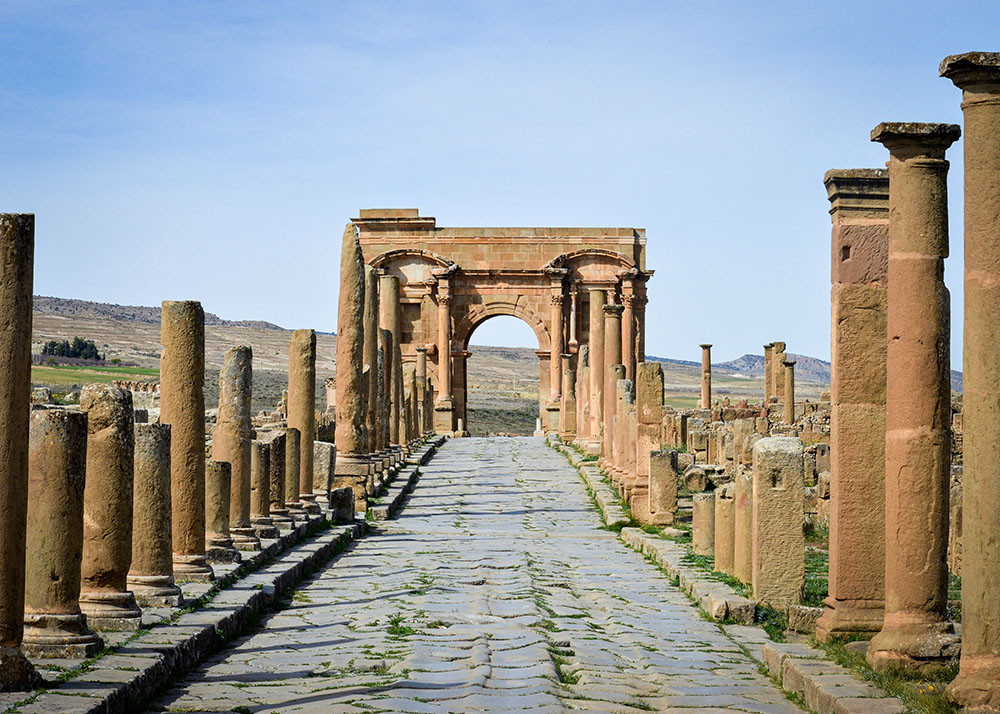
Ruins of the Roman Empire in the province of Batna, Algeria (Jamil Kabar)
Oppressive empires have always existed. Emperors have built their kingdoms on the backs of the dispossessed, convinced their power is divinely ordained. They call their conquests "peace" and name their destruction "defense," stripping people of their homes, dignity and right to grieve. Empire is always grasping and consuming, never asking, never listening. It expands without permission, without heed for the cries of those in its path. Expansion is its gospel; dominion, its sacrament.
The Roman Empire is one of history's most glaring testaments to this gospel of expansion. It devoured land and people alike, fueled by a thirst for wealth, resources and control. Conquest was not simply a strategy — it was a declaration of identity, a public liturgy of violence that cemented Rome's claim to the world.
They called it Pax Romana, the Roman Peace. But it was a peace maintained by the ever-looming threat of the sword, where submission was mistaken for stability. To be conquered by Rome was to be absorbed into a system that demanded allegiance, labor and the erasure of identity. And like followers of Jesus then, we know this kind of empire still moves among us today.
It speaks a new language now, but the hunger remains unchanged. We hear it in policies that displace and dispossess, in leaders who wield freedom as a weapon while taking it from others.
Consider the audacity of a declaration like President Donald Trump's: "The U.S. will take over the Gaza Strip and we will do a good job with it, too. ... I do see a long-term ownership position." This does not speak the language of justice or safety — it echoes the age-old voice of empire, one that will always justify devastation for the sake of its own security.
The words change, but the logic of domination does not. Empire always finds new names for its conquest. But the grief it leaves behind is the same.
Advertisement
Empire does not only exist in nations and rulers — it takes root in our own hearts, in the ways we seek to own, to control, to hoard. It teaches us to measure worth by how much we possess, to mistake accumulation for security. We live in a world where bigger is always better, where success is marked by reach, influence and dominance. But the gospel offers another way, a holy rebellion against empire's restless hunger.
Consider the words of the prophet Isaiah: "Woe to those who add house to house and join field to field till no space is left and you live alone in the land" (Isaiah 5:8). This is not a call to conquer, to build higher walls or expand borders. It is a warning against the unchecked greed that isolates and consumes.
The kingdom of God is not found in expansion but in the sacredness of enough — in a world where no one hoards and no one is left empty.
Jesus himself lived this counternarrative. He was born in obscurity, far from the palaces of power. He walked among the poor, ate with the despised, and built a kingdom not on land but on love. His way was not one of coercion but of presence. He did not conquer; he healed. He did not expand; he dwelled. His was a kingdom where the last would be first, where power was redefined as service and where greatness was found in humility.
And so we must ask ourselves: Where have we made peace with empire? Where have we accepted its hunger as normal?
If we are to follow Jesus, our lives must bear witness to a different kingdom — one where justice is not sacrificed for security, where love is not subordinated to power. We must resist the urge to grasp, to claim, to consume, and instead choose to root ourselves in what is small, what is slow, what is sacred.
We must refuse to speak the language of empire. We must reject the gospel of expansion. We must build a world where peace is not maintained by the threat of a sword, but by the presence of justice. Empire will always fall. But the kingdom of God — the kingdom of enough, of mercy, of holy resistance — will remain.






